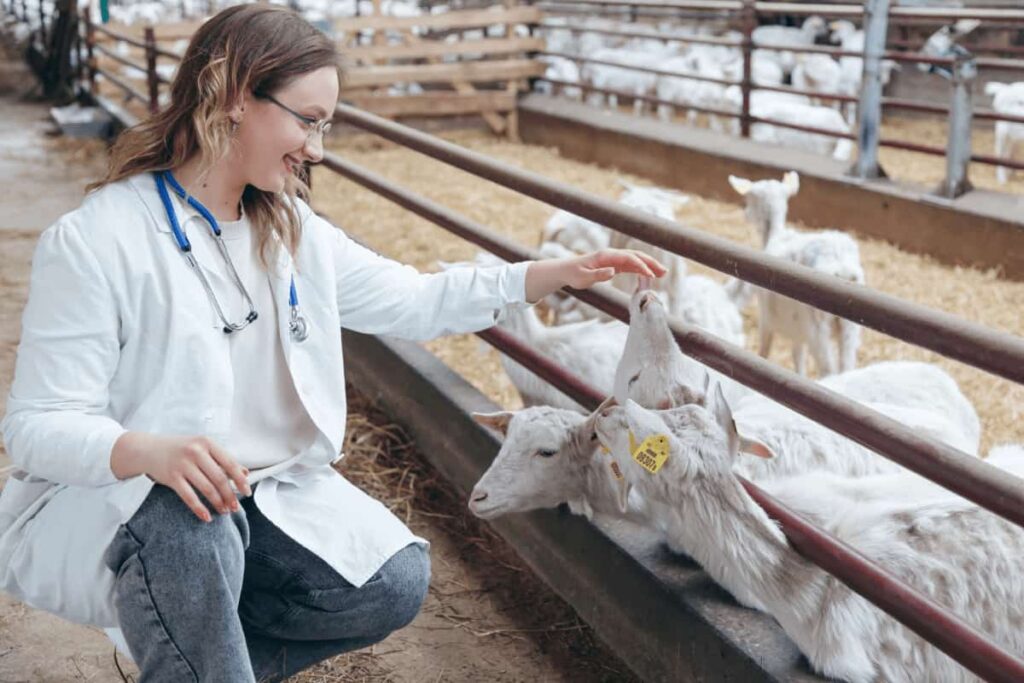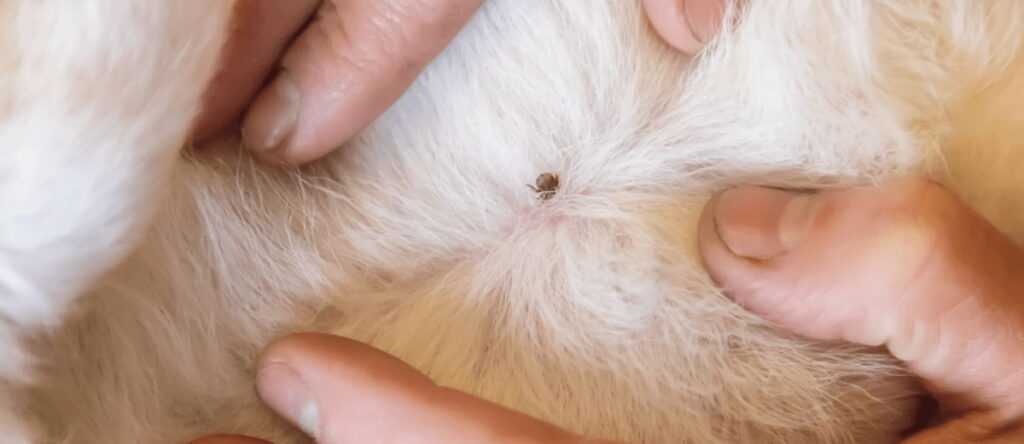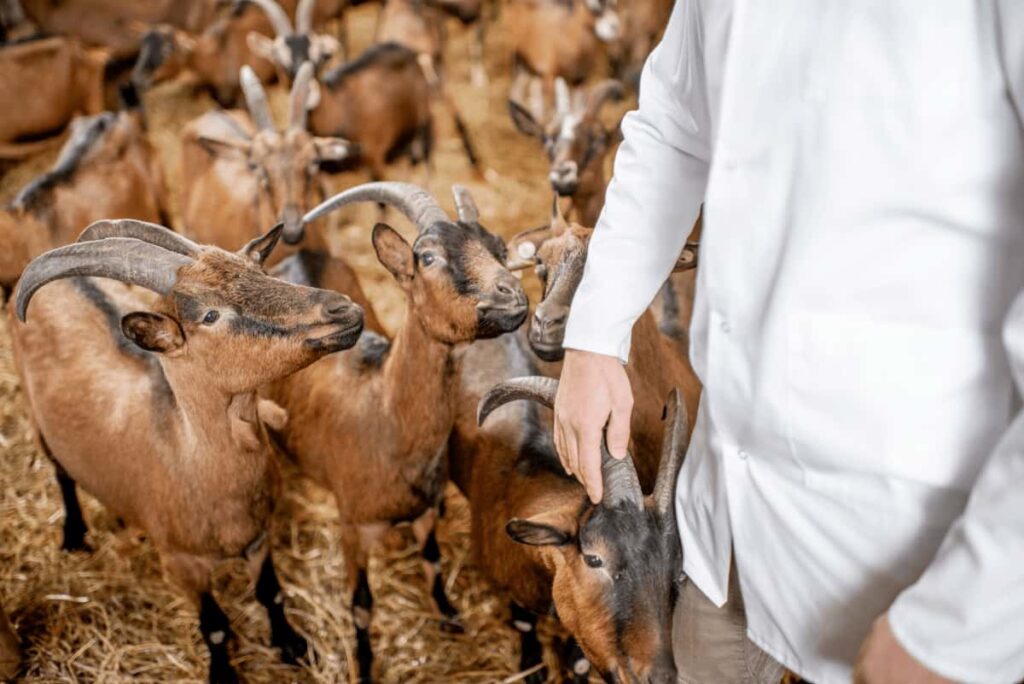Goats are susceptible to various diseases, and being aware of them is crucial in keeping their health in check. Maintaining the health of your goats is essential for their well-being and productivity. Goat diseases can be prevented by implementing proper management practices such as good hygiene, regular check-ups, vaccination program, and providing a balanced diet.

Goat Diseases and Their Treatment
Causes of Goat Diseases
- Goats are generally hardy animals but are still susceptible to various diseases. Understanding the causes of goat diseases is crucial in preventing them from occurring.
- One major cause of goat diseases is poor sanitation. Dirty living conditions can harbor bacteria and other pathogens that make goats sick. Goats should be kept in clean and well-ventilated spaces, with fresh bedding regularly provided.
- Another common cause of goat diseases is improper nutrition. Goats require a balanced diet rich in protein, vitamins, and minerals to stay healthy. A lack of essential nutrients or excess of certain feed components can lead to health problems.
- Inadequate vaccination against infectious agents is also a leading cause of goat illnesses. Farmers need to adhere strictly to vaccination schedules recommended by veterinarians.
- Farmers must ensure isolation procedures for infected animals are followed properly while disinfecting contaminated areas frequently.
- Introducing new goats into the herd without proper quarantine protocol could increase infection transmission risk among herd members.
Symptoms of Goat Diseases
- As a goat owner or caretaker, knowing the disease symptoms that indicate an unhealthy animal is important.
- The common signs of illness in goats is fever. This can be easily detected by feeling their ears, which may appear hot and dry. Another symptom that indicates disease is weight loss and decreased appetite. Goats suffering from any infection usually lose interest in eating and drinking water.
- Physical symptoms include diarrhea, coughing, eye or nose discharge, swollen joints, and limping. It’s also important to watch your goat’s behavior – if they suddenly become lethargic or depressed, it could mean something serious.
- In some cases, symptoms may not always be visible on the surface. For example, internal parasites such as stomach worms can cause damage internally without showing much outwardly visible signs.
- Therefore, goat owners must learn about various diseases affecting their animals so that they can identify them early enough before complications arise.
Treatment of Goat Diseases
- Early detection is the key point to treating goat diseases. Identifying symptoms and consulting a veterinarian as soon as possible can help prevent the disease from spreading to other goats and becoming more severe.
- Bacterial infections such as Anthrax, pneumonia, and Mastitis can be treated with antibiotics given by a veterinarian. It is important to carefully follow dosage instructions and complete the full course of treatment.
- Viral infections such as foot-and-mouth disease or goat pox may not have specific treatments. Supportive care like hydration, nutrition, and isolation are necessary to manage these illnesses.
- Parasitic infestations like internal worms or external mites require specialized medications targeting specific parasites affecting your livestock. A veterinarian will prescribe an appropriate medicine based on the type of parasite identified in your goats.
- In addition to medical treatments, proper sanitation practices are vital for preventing the further spread of diseases among your herd.
- By working with veterinary professionals and practicing good hygiene habits on your farm or ranch, you can effectively manage goat diseases before they become detrimental to your livestock’s health.
In case you missed it: Goat Breeding and Genetics for Improved Productivity and Disease Resistance

Bacterial Diseases of Goats
- Bacterial diseases can cause significant health problems for goats, leading to reduced productivity and even death. Anthrax is a major bacterial disease caused by the Bacillus anthracis. It primarily affects herbivores like cattle and goats. Infected animals may present symptoms such as high fever and difficulty breathing before dying suddenly without showing any other signs.
- Haemorrhagic Septicemia is another bacterial disease in goats with weakened immune systems. The disease causes high fever followed by rapid deterioration leading to septic shock or sudden death.
- Brucellosis is a highly infectious bacterial disease. Symptoms include abortion in pregnant does or infertility in males.
- Enterotoxaemia, commonly known as ‘overeating,’ happens when an animal eats too much carbohydrate-rich food rapidly, leading to bloating and digestive issues, causing severe abdominal pain.
- Footrot mastitis is a painful condition whereby bacteria get into small wounds on the goat’s feet, causing swelling and tenderness making it difficult for them to move around normally. Mastitis occurs during the lactation period; it causes inflammation of mammary gland tissues reducing milk production significantly if not treated promptly.
Preventing these diseases involves feeding your animals properly with clean water available at all times and keeping their living areas hygienic using disinfectants, regularly changing litter bedding, etc.; vaccinations against specific illnesses should be given timely based on veterinarian advice.
Viral Diseases of Goats
- Goats are susceptible to several viral diseases affecting their health and productivity. Peste Des Petits Ruminants (PPR) is one of the most significant viral diseases affecting goats, causing high fever, respiratory problems, diarrhea, and death in severe cases.
- Foot and Mouth Disease (FMD) is another contagious viral disease that affects goats. Although it does not usually cause fatalities in adult goats, it can severely impact their production by reducing milk yield and weight gain. FMD spreads rapidly through direct animal-to-animal contact or indirect transmission via contaminated feed or equipment.
- Goat pox is a highly infectious viral disease that causes skin lesions on the goat’s body. It also leads to decreased milk production and weight loss in affected animals.
Prevention of these viruses involves maintaining good hygiene practices such as regularly cleaning pens, disinfecting equipment, and quarantine measures on the farm, among others. Vaccination is also essential for protecting against these diseases, while practicing biosecurity measures reduces their spread.
Prevention of Goat Diseases
- Preventing diseases in goats requires a combination of good management practices and proactive healthcare measures.
- Maintaining a clean environment for your goats is paramount to keeping them healthy. This includes regularly cleaning their living spaces, providing fresh water and feed, and minimizing contact with other animals carrying diseases.
- Proper nutrition for your goats can strengthen their immune systems and prevent certain illnesses. A balanced diet of high-quality hay or pasture grasses supplemented by grains or pellets can help keep your goats healthy.
- Vaccinations are essential to preventing many common goat diseases. Consult a veterinarian to determine which vaccines are necessary for your herd based on location and risk factors.
- Prevention is key to protecting your goats from disease. Implementing good biosecurity measures, monitoring herd health regularly, and providing proper nutrition are all essential to keeping your goats healthy.
- Good healthcare practices are essential when keeping goats healthy and free from potential illnesses. Proper feeding with balanced nutrients plus preventive measures such as regular vaccinations can help keep your herd safe from the most common goat diseases.
- Monitoring your goats’ health through regular check-ups helps detect potential health issues before they become major problems affecting the entire herd.
In case you missed it: Marketing Trends/Strategies and Opportunities for Goat Products

Conclusion
Goats are vulnerable to various diseases and illnesses caused by multiple factors, such as viruses, bacteria, parasites, and poor nutrition. Goat owners need to know about common diseases that can affect their animals. This knowledge enables them to detect symptoms early enough and provide proper treatment.
- Types of Grass Growing for Goat Farm
- How to Train Goats for Milking: A Beginners Guide
- Goat Milking Practices and Equipment: A Beginner’s Guide
- Goat Farming for Fiber: Producing Mohair and Cashmere
- Maximizing Goat Milk Production: Tips for Dairy Goat Farmers
- Goat Farming as a Family Business: Strategies for Success
- Profitable Kenya Goat Breeds for Commercial Dairy and Meat Business
- Unlock the Secrets of Oberhasli Goat: Discover Raising and Management Practices
- Ultimate Guide to Myotonic Goats: Explore Profile to Raising
I wanted to start Goat Farming in Chennai, Tamil Nadu. Can you please guide me in the setting up of business and Bank assistance for the development of the buisness
Very nice information. Highly useful for farming.
Fantastic